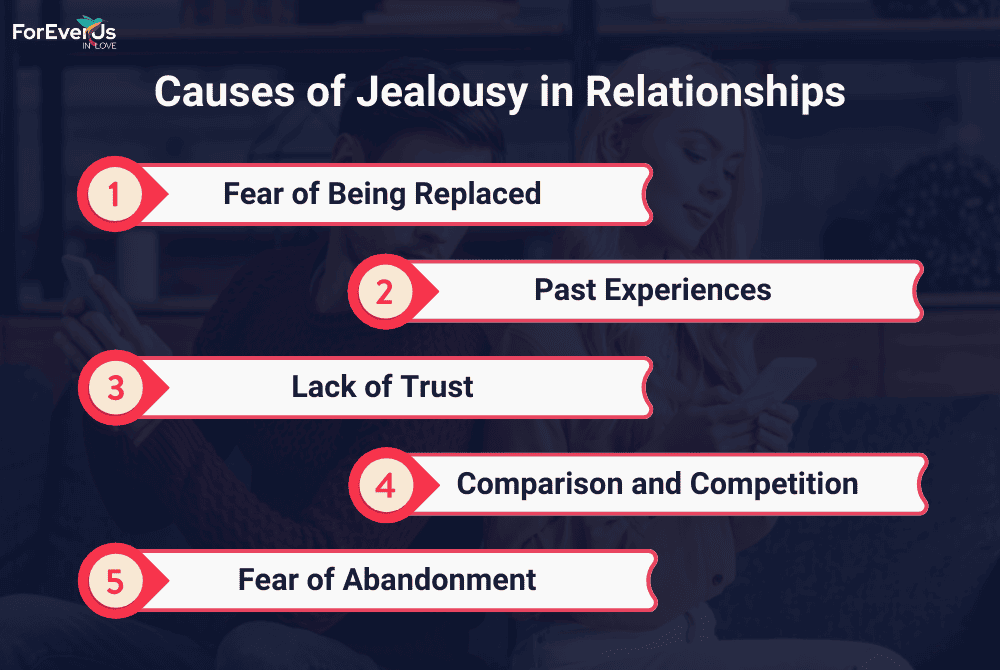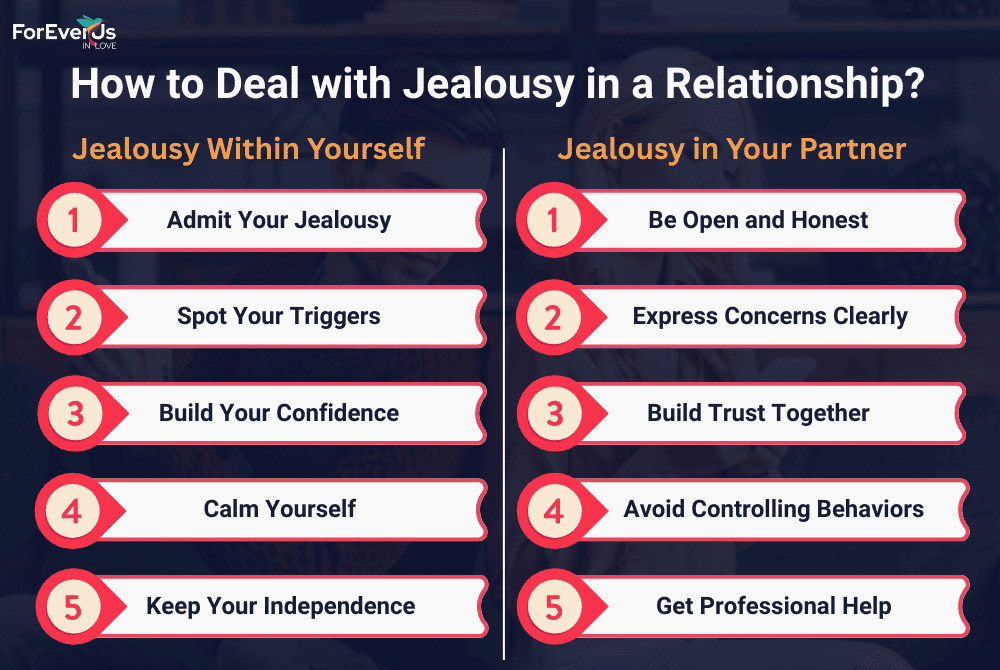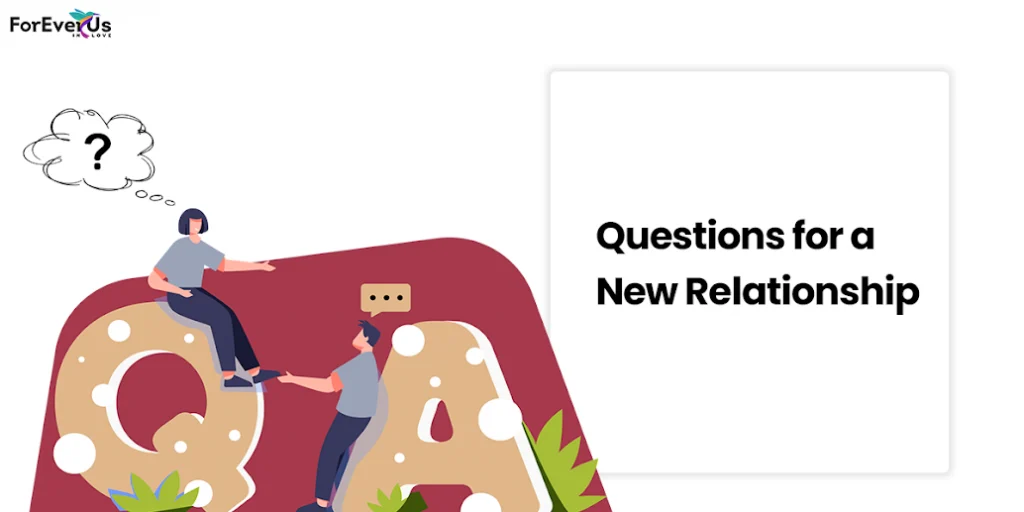Do you sometimes feel jealous in your relationship and wonder if that’s normal?
Maybe you get uneasy when your partner talks to someone else or feel insecure for no clear reason. Jealousy is a natural feeling, but if it becomes too intense, it can harm your relationship and create unnecessary stress.
The good news is that you can manage jealousy. By understanding what triggers it and finding healthy ways to cope, you can strengthen trust in your relationship.
In this blog, we’ll explore why jealousy occurs, how to spot it when it’s becoming a problem, and some easy steps to handle it in a positive way. Keep reading to learn how to turn jealousy into something good instead of letting it drive a wedge between you and your partner.
What is Jealousy and How Does It Affect Relationships?
Jealousy is a common feeling that arises when you worry about losing your partner’s love or attention. It often comes from insecurity, fear, or past experiences. Sometimes, jealousy can bring couples closer together, but too much can cause issues. Building trust in a relationship is essential to keeping jealousy in check and ensuring a strong foundation.
A bit of jealousy can be healthy because it shows you care. However, excessive jealousy can create trust problems and lead to arguments. It’s crucial to recognize the difference so your relationship remains strong.
If jealousy makes you feel anxious all the time or leads you to control your partner’s actions, it might be time to talk about your feelings, work on building your self-confidence, or seek advice from someone you trust.
Causes of Jealousy in Relationships
Jealousy is one of those emotions we all experience at some point in our life but don’t like to accept it. It can creep into our relationships, havoc our peace, make us feel like we are out of control, and soon become harmful towards each phase of life.
So, let’s dive into the root causes of jealousy and share how we can deal with them effectively to plant a seed of healthier and happier relationships.

Fear of Being Replaced
People rarely sense envy until they feel threatened by another person or entity.
- Sibling jealousy is typically motivated by a child’s concern that their parents will replace them with a new sibling or will prefer another sibling.
- In a romantic relationship, the third individual does not have to constitute harm indeed; being perceived as a threat is enough to set envy in motion.
Past Experiences
Our past experiences shape our current world. If we’ve been hurt, misled, or disappointed in previous relationships, we bring those wounds into our current ones. These unresolved concerns can cause envy because we reflect our prior fears onto our current situation.
Lack of Trust
Trust is the foundation of all healthy relationships. If there has been a breakdown of trust, or if the trust was never correctly formed, jealousy can quickly take root. Without trust, every action and contact is viewed through the lens of suspicion and skepticism.
Comparison and Competition
In today’s society, social media has made it far too simple to compare oneself to others. We see edited snippets of other people’s lives and relationships, and we feel dissatisfied. This constant comparison can fuel jealousy because we become preoccupied with what we believe others have that we do not.
Fear of Abandonment
Jealousy is typically driven by a fear of being abandoned. We are concerned that our partner may discover someone better and leave us. This dread can be overwhelming, leading to controlling or possessive behaviors as we try to protect what we have.
Normal vs. Unhealthy Jealousy in Relationships
Jealousy is a natural feeling, but there’s a big difference between normal jealousy and unhealthy jealousy. Knowing the difference can help you keep your relationship strong and happy.
What is Healthy Jealousy?
A little jealousy is normal and can even indicate that you care. Healthy jealousy occurs when you feel a small sense of protectiveness but still fully trust and respect your partner.
For example:
- You feel a bit jealous when someone flirts with your partner, but you discuss it calmly instead of getting angry.
- It reminds you to show appreciation and love for your partner.
- It helps you set healthy boundaries without being controlling.
- Healthy jealousy is short-lived and manageable.
- It won’t take over your emotions or make you act in harmful ways.
What is Unhealthy or Extreme Jealousy?
Jealousy becomes a problem when it leads to constant suspicion, fear, or the need to control. Instead of bringing you and your partner closer, it pushes them away and creates stress in the relationship.
Signs of extreme jealousy include:
- Always question what your partner does.
- Feeling anxious or suspicious without a reason.
- Trying to control their friendships or activities.
- Checking their phone, social media, or messages without them knowing.
- Getting upset when they spend time with other people, even friends or family.
- Accusing them of things without any proof.
When jealousy leads to mistrust, fighting, or trying to control, it can hurt the relationship. Instead of letting jealousy take over, talk about your feelings, work on building trust, and focus on your happiness.
Effects of Jealousy on a Relationship
Jealousy can have both good and bad effects on a relationship, depending on how you deal with it.
When Jealousy is Handled Well
A little jealousy can actually bring partners closer together. It shows that you care about each other. When you talk honestly about your feelings and trust one another, jealousy can:
- Strengthen your connection by reminding you not to take each other for granted.
- Encourage open talks and help set clear boundaries.
- Make you appreciate your partner more and motivate you to invest in your relationship.
When Jealousy Gets Out of Control
If jealousy is not managed properly, it can hurt your relationship. Too much jealousy can lead to:
- Trust issues: Constantly doubting your partner can push them away.
- Frequent arguments: Regular fights over small things can make both partners unhappy.
- Stress and emotional pain: Feeling jealous all the time can be draining.
- Control issues: Trying to control what your partner does can make them feel trapped.
When jealousy goes too far, it can create distance and misunderstandings and make both partners feel unhappy or ignored.
How to Deal with Jealousy in a Relationship?

How to Deal with Jealousy Within Yourself?
Admit and Understand Your Jealousy: The first step is to recognize that you’re feeling jealous. Don’t push it aside. Ask yourself what’s causing these feelings. Is it fear, insecurity, or past experiences?
Spot Your Triggers: What situations make you feel jealous? It could be when your partner chats with someone else or doesn’t reply to your messages right away. Knowing your triggers can help you manage your feelings better.
Build Your Confidence: Jealousy can sometimes come from feeling like you’re not good enough. Focus on your strengths, set personal goals, and practice self-love to feel more secure in who you are.
Calm Yourself: When jealousy strikes, try calming activities like journaling, deep breathing, or talking to a friend. Instead of reacting right away, take some time to process your emotions.
Keep Your Independence: Your relationship should complement your life, not define it. Engage in hobbies, spend time with friends, and enjoy your own interests. This helps you feel more secure and less reliant on your partner for happiness.
Stay Present: Jealousy often comes from overthinking. Rather than jumping to conclusions or worrying about what might happen, focus on the present. Concentrate on what is real, not what your mind is inventing.
How to Deal with Jealousy in Your Partner?
Be Open and Honest: If your partner feels jealous, don’t ignore their feelings. Talk calmly and let them know you understand. Reassure them instead of getting defensive, as honesty in a relationship helps build trust and connection.
Express Your Concerns Clearly: If their jealousy is hurting your relationship, share your feelings using “I” statements. For example, say, “I feel uneasy when you don’t trust me,” instead of placing blame.
Build Trust Together: Trust grows over time. Be dependable, keep your promises, and show your partner they can believe in you.
Support Their Growth: Help your partner feel confident by encouraging their hobbies, goals, and friendships. When they feel appreciated, their insecurities may lessen.
Avoid Controlling Behaviors: If your partner’s jealousy leads to controlling actions, make sure to set clear limits. A healthy relationship is based on trust, not control.
Get Professional Help if Needed: If jealousy keeps causing issues, talking to a therapist can help both of you understand and deal with it better. A professional can give advice on rebuilding trust and improving communication.
Key Takeaways
- Jealousy is natural, but it should not control your relationship.
- A little jealousy can strengthen love, while too much can damage trust.
- Understanding the cause of jealousy helps manage it better.
- Healthy jealousy reminds partners to value each other, while unhealthy jealousy leads to control and insecurity.
- Common causes of jealousy include fear of abandonment, past experiences, and lack of trust.
- Open communication with your partner can ease jealousy.
- Talking openly and building trust are the best ways to deal with jealousy in a relationship.
- Building self-confidence and having your interests can reduce jealousy.
- Mindfulness and self-awareness help recognize and control jealous feelings.
- A strong relationship is based on trust, respect, and emotional security.
FAQs
What causes jealousy in a relationship?
Jealousy is often caused by fear of losing your partner, low self-esteem, past relationship trauma, or lack of trust. Social media comparisons and personal insecurities can also trigger jealous behavior.
Can jealousy ruin a relationship?
Yes, while mild jealousy can be manageable, obsessive or controlling jealousy can damage trust, create emotional distance, and eventually lead to the breakdown of a relationship.
How do I stop feeling jealous in a relationship?
Start by identifying your jealousy triggers and working on your self-confidence. Open communication, setting healthy boundaries, and focusing on personal growth are key to overcoming jealousy.
How can I support a jealous partner?
Reassure them with consistent actions and honest communication. Help them feel emotionally secure, set clear boundaries, and encourage self-reflection. If jealousy becomes extreme, consider seeking therapy together.
Is jealousy a sign of love or insecurity?
Jealousy is often mistaken for love, but it typically stems from fear, insecurity, or low self-worth. While a little jealousy may show you care, excessive jealousy can be emotionally harmful and unhealthy.
How can I build trust and overcome jealousy?
Trust is built through honesty, consistency, and emotional safety. To overcome jealousy, focus on self-worth, avoid overanalyzing situations, and remind yourself of your partner’s loyalty and love.
Is it normal to feel jealous sometimes in a relationship?
Yes, occasional jealousy is normal and even natural in relationships. It becomes a problem when it leads to controlling behavior, mistrust, or emotional stress. The key is recognizing it early and addressing it in a healthy, open way.
What’s the difference between healthy and unhealthy jealousy?
Healthy jealousy is short-lived and leads to honest conversations and stronger emotional bonds. Unhealthy jealousy involves constant suspicion, accusations, or need to control your partner’s actions. The difference lies in how you respond to your feelings and whether trust is present.












